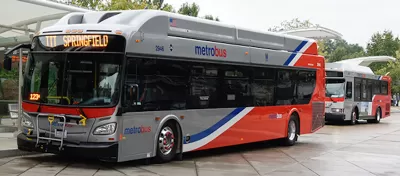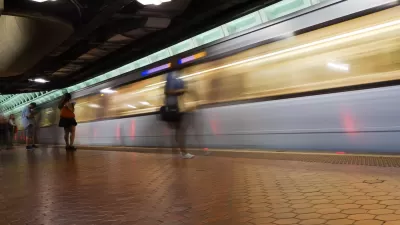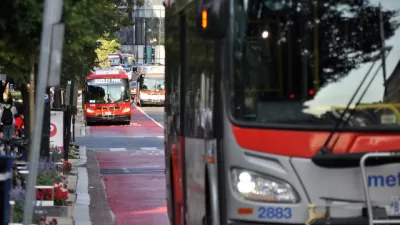The agency plans to significantly expand bus service, which can be added faster and at a lower cost than rail projects.

The Washington D.C. transit agency is focusing on buses as it plans a major expansion, reports Rachel Weiner in The Washington Post. Metro’s planned “Better Bus Network,” which launches in June, streamlines the bus system to eliminate some stops and increase service speed. The agency also plans to add hundreds of miles of new dedicated bus lanes and new bus routes over the next two decades.
With federal funding for proposed rail projects in jeopardy, transit leaders are betting on buses as a more affordable way to build a more robust transit network. Today, Metro bus ridership is above pre-pandemic levels, unlike rail ridership. “Bus lanes have the potential to sidestep literal and figurative gridlock, skirting the kinds of costly battles that can derail bigger projects more reliant on federal dollars.”
According to Weiner, “Already, nearly as many people ride Metro buses every day as Metro trains. But these plans aim to double that ridership, bringing in people who have the option to drive.”
However, “Transit experts agree that at a certain distance or population density, buses are no longer effective,” and rail is a key component of a regional transportation network.
FULL STORY: The future of Metro is the bus

Planetizen Federal Action Tracker
A weekly monitor of how Trump’s orders and actions are impacting planners and planning in America.

Vehicle-related Deaths Drop 29% in Richmond, VA
The seventh year of the city's Vision Zero strategy also cut the number of people killed in alcohol-related crashes by half.

As Trump Phases Out FEMA, Is It Time to Flee the Floodplains?
With less federal funding available for disaster relief efforts, the need to relocate at-risk communities is more urgent than ever.

LA Transit Ridership Plummets Amidst ICE Raids
LA Metro’s bus and rail lines are seeing up to 15 percent lower ridership in the wake of violent immigration arrests.

A New Texas Neighborhood is Powered by Geothermal Energy
The 7,500-home development claims to be Austin’s ‘first zero energy planned community.’

Data: In Rural America, Mobile Homes are Heat Traps
Extreme heat is often viewed as an urban problem, but rural communities face their own unique risks.
Urban Design for Planners 1: Software Tools
This six-course series explores essential urban design concepts using open source software and equips planners with the tools they need to participate fully in the urban design process.
Planning for Universal Design
Learn the tools for implementing Universal Design in planning regulations.
Heyer Gruel & Associates PA
JM Goldson LLC
Custer County Colorado
City of Camden Redevelopment Agency
City of Astoria
Transportation Research & Education Center (TREC) at Portland State University
Camden Redevelopment Agency
City of Claremont
Municipality of Princeton (NJ)





























